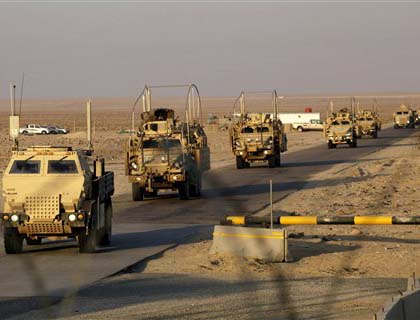The US combatant troops left Iraq after years of engagement. When they invaded the country, there were thousands welcoming them and thanking former US President, Mr. Bush for ending the decades-long dictatorship. Initially, streets of Baghdad and other cities across the country looked friendly to American troops, but day by day they started getting strange.
During past days, they were withdrawing in a manner not to be exposed to public notice. Unlike their engagement in 2003 when thousands were delighted seeing them, there was a public demand for their withdrawal. Sunni sect from the very start was against the presence because they viewed them as a force that ended their long-rule over the country. The case was similar for radical Shiite group led by Moqtada al Sadr.
Months ago when Washington started discussing about the destiny of military engagement after 2011, a very strong protest organized by followers of Moqdata al-Sadr, said they would got Americans out of the country by force.
Perhaps, recently there were serious negotiations between officials of the two countries, but regional and domestic pressure on Noor-al-Maliki administration brought them into blunt failures.
Though President Barack Obama came to White House mainly because of opposing Iraq war, for which reasons proved unauthentic and false. Former president, G. Bush attacked Iraq and brought down Saddam Hussein for two reasons: his support to al-Qaeda and second having mass destruction weapons.
Right after 9/11 when anti-terrorism hatred changed into gigantic storm and global mentality supported US military activities to go after them and hunt their leaders like al-Qaeda, proportionately Washington decision makers resolved to ride on the waves and pressurize countries opposing or challenge its policy across the globe.
President Bush clearly said that those who were not with US were with al-Qaeda and terrorist. He made very stark distinction between friends and foes. His statement clearly was based on the ideology—good and bad, nothing else. He attacked Iraq with no UN's mandate, which cost Washington a lot in diplomatic sphere.
That policy was indeed proved harmful to US international fame and prestige. Many countries were resented. They interpreted the statement that Washington asked them to follow the lead blindly. When those who wanted to support turned back to it, like Turkey initially avoided allowing American air force to use its military airports.
The response of these was clear: we can be with not parts.
But top White House remained decisive to persist on their policy with no retreat.
Policy makers pushed to reward followers and punish oppositions. In 2001, US and its allies intervened in Afghanistan and toppled the supporter of terrorism. The blow was big enough that Taliban militants could not reestablish the structure and mount pressure against foreign involved forces. So, Washington without considering the possible resurge of insurgency in the country, Washington started another war which was comparatively far difficult to Afghanistan one.
But President Bush actually did not care much. What Washington officials cared much was about uprooting Saddam Hussein who kept no warm relation with West during his incumbency. And they cared much about the outcome and output of war. A world without al-Qaeda and its leader Osma bin Laden looked much attractive and better. Same was the case with a world without Saddam Hussein who many maintained following secret mass destructive weapons.
So, White House officials thought that when Saddam Hussien si brought to justice and Osama bin Laden and Mullah Omer executed, then the international community would appreciate US's quick military action. Perhaps, their assumption might prove true if everything went according to military, economic and political calculations.
But the process stumbled severely and there are statements talking about US failure in both fronts——Afghanistan and Iraq.
The world without Saddam Hussein does not look as ideal as depicted. Two very reasons former President used to convince House and Congress for attack on Saddam Hussien regime proved false. After the occupation of Iraq, there was no document to denote on Saddam regime's linkage with terror network. And the secret program for mass destruction weapons was an illusion.
So with the both reasons phony, was the war justifiable? Seemingly, Americans increasingly turned against the Iraq and pressures enlarged to end it as soon as possible. Due to the same, republicans lost both Houses as well as presidential election. President Obama came to power with the promise to end the war in Iraq and concentrate on Afghanistan and finally call troops back from there too.
Meanwhile, due to increasing friction with Islamic Republic of Iran, President Obama has also not been willing to waste the achievements of nine years of engagement. The war proved too costly for Americans. Around five thousand American troops lost their lives and around 30 thousands injured. And it imposed around a trillions dollars to government's budget, suffering itself from huge deficits.
Therefore, to prevent countries like Iran to benefit from American toils, Washington discussed about keeping a small portion of combatant force in the country. But the negotiation failed and Americans troops left the country.
Now the question is put like this: does the loss of Americans compete with their gains?
The answer is negative. The anti-American radical groups have a lot to say in the current government. The ear of Noor-al-Maliki is indebted much to his coalition partners instead of Washington.
The position of Iraq in the case of Syria is a clear example when against the will of US; Iraq opposed suspicion of Syria in Arab League. And the American companies also do not have visible presence in the oil-linked projects.

